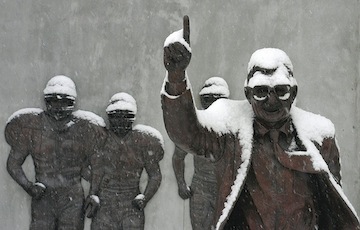Will the denials ever end?
In November of last year, I wrote a column here, Crime and Punishment at Penn State, about the infamous sexual assault case involving Jerry Sandusky. At that time, it seemed clear to me that legendary football coach Joe Paterno, who died of lung cancer in January, was complicit in covering up the crimes of Sandusky, his longtime defensive coordinator, and I wondered how a devout Catholic, such as Paterno was known to be, could have failed – over the course of more than a decade of allegations against Sandusky – to see to it that police were brought in, thus protecting other children from the heinous predator. Had the scandals in the Church taught him nothing?
Last week, former FBI director Louis Freeh, also Catholic, released the report on the Sandusky Affair that he had been commissioned to undertake by the Penn State board. His investigation was meant to uncover why it took so long for Sandusky’s crimes to be stopped. (Sandusky was convicted last month on 45 counts of abuse against ten boys.) As ESPN reported after Freeh’s press conference:
Joe Paterno and other top Penn State officials hushed up child sex abuse allegations against Jerry Sandusky more than a decade ago for fear of bad publicity, allowing Sandusky to prey on other youngsters, according to a scathing internal report issued Thursday on the scandal.
In the aftermath of Freeh’s digest of conclusions, the supporters of JoePa (led by former players and the Paterno family) rushed in to insist, even as they acknowledged the facts in the report, that Freeh’s conclusions couldn’t possibly be true. Penn State linebacker, NFL star, and now pro-football analyst Matt Millen swore to ESPN anchor Chris McKendry that JoePa never cared about bad publicity. The Paterno family statement flatly admits that JoePa “wasn’t perfect” (which in court would raise an attorney’s objection that it refers to a fact not in evidence) but adds:
To think . . . that he would have protected Jerry Sandusky to avoid bad publicity is simply not realistic. If Joe Paterno had understood what Sandusky was, a fear of bad publicity would not have factored into his actions.
But assistant coach Mike McQueary had told Coach Paterno in 2001 – during a face-to-face meeting the next morning (that included McQueary’s father) – that he had seen Sandusky raping a boy, 10 or 12 years old, in a shower room in the Penn State football facility. So how is it Coach Paterno can be said not to have “understood what Sandusky was”?
As Director Freeh emphasized: “The most powerful men at Penn State failed to take any steps for 14 years to protect the children who [sic] Sandusky victimized.”

And about the reason for the silence of officialdom at Penn State, the Freeh Report could not be more explicit: “In order to avoid the consequences of bad publicity, the most powerful leaders at the university . . . repeatedly concealed critical facts relating to Sandusky’s child abuse.”
As I wrote in November:
Football and basketball coaches make much more money and, therefore, command more power than most college presidents. Many believe they are a law unto themselves. The Program above all.
There was much talk on Thursday about how the Sandusky Affair must not be allowed to tarnish the legacy of Joe Paterno, but that’s wishful thinking that is both ridiculous as to the eventuality and immoral as to the circumstances, as we now know them to be. Freeh was not conducting a criminal prosecution, although there are civil cases pending and criminal action against other PSU officials is possible. Were Coach Paterno still alive he would likely be the object of an indictment, since he “was an integral part of this active decision to conceal” Sandusky’s crimes.
Rather like the “sex-abuse” crisis in the Church, Penn State’s nightmare ended in the aftermath of the revelations. Although colleges and universities large and small need to carefully regulate and scrutinize the power and practices of sports programs, the incidences of pedophilia in those programs is infinitesimal. When I say Penn State’s nightmare has ended, I mean the horror of the rape of children, not the dreadful legal consequences and painful moral questioning that will burden the university community for years to come. But we can all move on now, lessons having been learned. (And, contra the likes of author Buzz Bissinger or ESPN’s Joe Bryant, PSU should not drop football. Perhaps, however, Paterno’s statue should come down.)
Speaking of the Freeh Report’s conclusions about JoePa’s complicity, NIKE co-founder Phil Knight, previously a staunch defender of Paterno against charges of a cover-up, said:
“I missed that Joe missed it, and I am extremely saddened on this day.”
That’s well said. But how, we might ask Mr. Knight, since football profits at PSU are already $50 million annually, will the further inflow of his and others’ sponsorship money, and the TV money, and the alumni money into all college sports be accommodated without sacrificing higher education’s core mission? In the Sandusky case, the power of The Program allowed rape to go on; at other universities protecting The Program tolerates illegal recruiting, grade fixing, extortion, and a host of other crimes.
The lesson here isn’t that one good man can make a bad mistake (that’s original sin), but that a culture of greed and power has been allowed to put at risk the games we play. The games. We play.
__________















